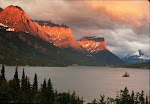Brandon Fibbs, http://brandonfibbs.com/2006/05/24/an-inconvenient-truth/ , in a favourable review, points out that Al Gore is right and the climate debate is effectively over. Scientific opinion overwhelmingly supports the view that global warming is principally man-made and time is running out for us to find solutions. He says that Gore has a mass of scientific data, charts, diagrams & photographic evidence, enough to convince even the most hardened sceptic. What he finds most alarming is the time-lapse photos of Patagonia, Kilimanjaro, etc. He ends his review by praising the fact that the movie is not pessimistic but rather closes with practical advice as to how we can get emissions back to the levels of 1950.
Scott Nash, http://www.rottentomatoes.com/m/inconvenient_truth/articles/156, in a more negative review, says that the film is about Al Gore & his political ambitions, rather than about global warming. He goes on to complain that, with his references to his son's car accident & his sister's death from lung cancer, Gore is being emotionally manipulative. He also criticises the movie for making political digs at Bush & the Republicans. He feels that this will only alienate a lot of people Gore is trying to win over to his point of view. Eric, in a review at the same address, questions the before & after photographs, pointing out that many of the old photos could have been taken in winter & the latest ones in summer.
What is my opinion? I agree with the first review insofar as the mass of evidence, incidentally very effectively & colourfully presented, is, if nothing else, food for thought. It would seem impossible to refute the fact that global warming is a dangerous threat to the planet. I personally don't mind the personalising of the movie as I feel Gore is effectively pointing out that his & our personal tribulations are as nothing to the threat to the whole of mankind. With regard to Eric's point about the photographic evidence, there may be some validity to it, but surely not with regard to Kilimanjaro where there is little, if any, seasonal alteration. The political point made by Scott is more interesting because, in both the film & its trailer, Gore emphasises that the issue is moral, not political, but he concludes the film by saying that only political will can solve the problems created by climate change & that political will is a renewable source in the USA.
Subscribe to:
Post Comments (Atom)



No comments:
Post a Comment